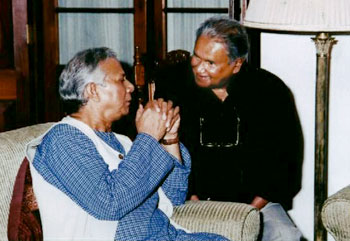Poverty free world within reach - Prof. Yunus
The Grameen Bank methodology is doing the opposite of what
conventional banks do said, Nobel Peace Prize winner Prof. Muhammad
Yunus delivering a lecture in Colombo.
|
Nobel Peace Prize winner
calls on Dr. Lalith Kotelawala

Prof. Muhammad Yunus, the Nobel Peace Prize winner in 2006 and
founder of the Grameen Bank during his visit to Sri Lanka called
on Dr. Lalith Kotelawala, Chairman, Ceylinco Grameen Credit
Company. |
He said, "I know nothing about banking but I am a banker of a
different kind. If I was an expert on banking I would not have done the
same things I did and in that sense I consider myself lucky. He said
that the banking system not only rejects the poor but also women. It is
not that they don't have bad debts in their books and are quite used to
it, but rules stand in the way.
Prof. Yunus said, "I believe that we can create a poverty free world
because poverty is not created by poor people.
It has been created and sustained by the economic and social system
that we have designed for ourselves; the institutions and concepts that
make up that system; the policies that we pursue."
Poverty is created because we built our theoretical framework on
assumptions which underestimates human capacity, by designing concepts
which are too narrow (Such as concept of business, concept of credit
worthiness, concept of entrepreneurship, concept of employment) or
developing institutions which remain half-done (such as financial
institutions where the poor are left out).
Poverty is caused by the failure at the conceptual level, rather than
any lack of capability on the part of people. I firmly believe that we
can create a poverty free world if we collectively believe in it. In a
poverty free world the only place you would be able to see poverty is in
the poverty museums.
The future generation would be horrified to see the misery and
indignity that some human beings had to go through. They would blame
their forefathers for tolerating the inhuman conditions which existed
for so long, for so many people.
Grameen has given me an unshakeable faith in the creativity of human
beings and it has led me to believe that human beings are not born to
suffer the misery of hunger and poverty.
To me poor people are like Bonsai trees. When you plant the best seed
of the tallest tree in a flower pot you get a replica of the tallest
tree, only inches tall. There is nothing wrong with the seed you planted
only the soil base is inadequate. The same theory applies to poor
people. There is nothing wrong in their seeds, but society never gave
them a base to grow.
Therefore all it needs to be done to get the poor people out of
poverty is to create an enabling environment for them. Once the poor can
unleash his or her energy and creativity, poverty will disappear very
quickly, Prof. Yunus said.
He said that many of the problems in the world today including
poverty persist because of a too narrow interpretation of capitalism. In
my view capitalism is a half told story and by defining entrepreneur
ship in a broader way we can change the character of capitalism
radically and solve many of the unresolved social and economic problems
within the scope of the free market.
Prof. Yunus said that he supports globalisation and believes that it
can bring more benefits to the poor than any alternative. But it must be
the right kind of globalisation.
"To me globalisation is like a hundred-lane highway, its lanes will
be taken over by the giant trucks from powerful economies. Bangaladeshi
rickshaws will be thrown off the highway.
To have a win-win globalisation there must be traffic rules, traffic
police and a traffic authority.
The rule of the strongest takes it all must be replaced by rules that
ensure that the poorest have a place and a piece of the action without
being elbowed out by the strong. Globalisation must not become financial
imperialism.
Prof. Yunus said that in 1974 he became involved in the poverty issue
not as a policy maker or a researcher but because he could not turn away
from it.
He said "in the backdrop of the terrible famine spreading across
Bangladesh I found it difficult to teach elegant theories of economics
in the University Classroom.
Suddenly I felt the emptiness of those theories in the face of
crushing hunger and poverty and I wanted to help even one person to get
through another day with a little more ease.
That brought me face to face with the poor people's struggle to find
the tiniest amounts of money to support their efforts to eke out a
living. This led me to create a separate bank for the poor named Grameen
Bank. Today the bank gives loans to nearly 7.2 mln poor people of whom
97% are women.
SG |
